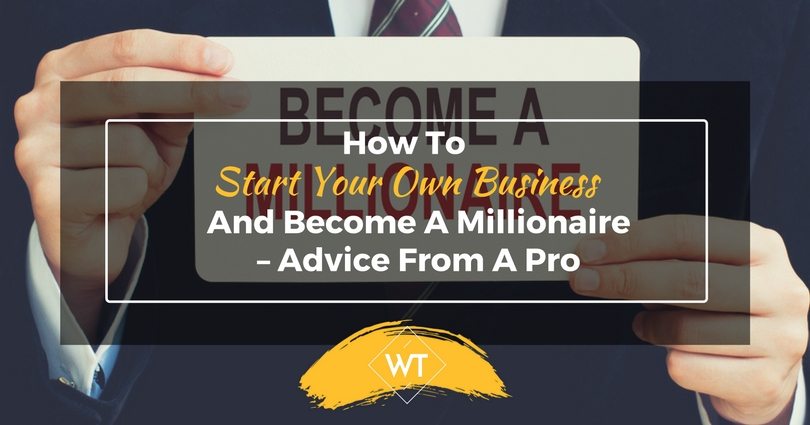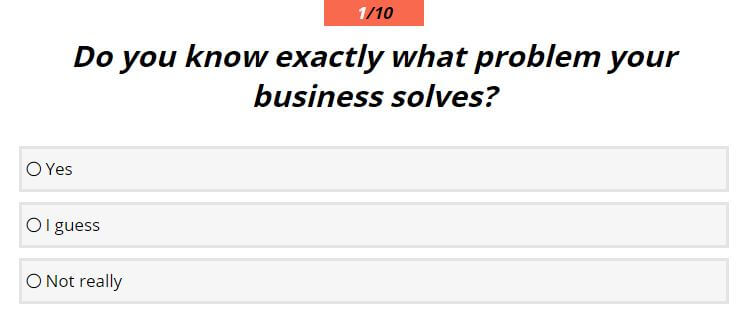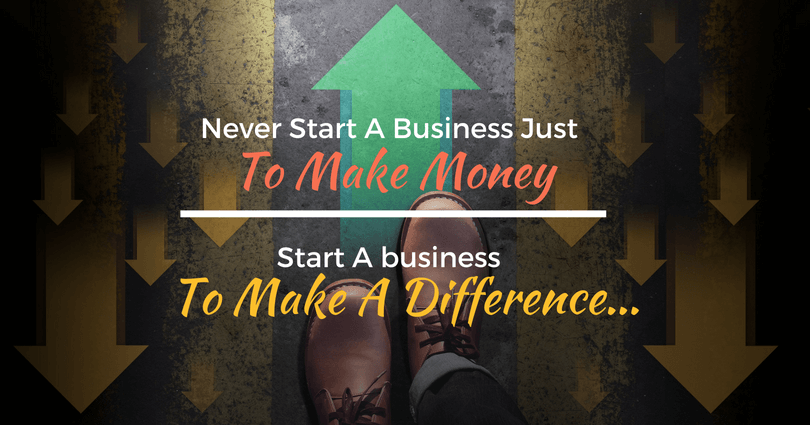How To Start A Business And Become A Millionaire – Advice From A Pro

I know that a lot of you are excited to start your own business. To that end, I wanted to bring you something special. And I think I’ve done that.
The other day, I was reading an article in Forbes. It was so amazing, I literally had to stop what I was doing, make a course correction, and seek out more.
I had stumbled upon a self-made Millionaire Laszlo Nadler. What this gentleman did was rather unique. He is a one-man business. Meaning he’s the only employee. Father of two. Meaning he doesn’t have all the free time in the world. And he’s married, so let’s assume he’s trying to keep his relationship together as well.
Fair enough. I’m sure lots of people fall into this category. What makes him different?
- Well, in just one year he took that business to over $1 million in revenue. That’s different!
- And he doesn’t have a storefront. Or even an e-commerce website. He has an Amazon store. Also different!
And this year he’s looking to break $2 million. He’ll do it as well. How do I know? And what does this have to do with you? Well I interviewed Laszlo Nadler. You’re welcome!. Here’s what I found out.
How to start a business
If you have your own business idea and want to start your own business with it or want to learn how to start a business, you can take our free assessment and check if your business idea is viable. Take the quiz and make your decision right away!
Some of you are probably more advanced than I am. I’m OK with that. I’d like to think our readers are very advanced. But in my case, I had no idea what an Amazon store was. This is where a lot of my questions were focused. And I’m really glad that this is the case because it dispelled a lot of myths for me.
These are things that were holding me back or false limitations I had put in place, and things I think a lot of us face. Hopefully, this article can help you overcome that.
Wisdom Times (WT): So what exactly is an Amazon store?
Laszlo Nadler (LN): A company’s product offerings on Amazon.
WT: Ha-ha! OK that’s fair enough. How exactly does one go about getting one? How do you start your own business?
LN: That’s actually the easiest part. You just sign up for a Professional Seller’s Account.
Now, although I’m sure you guys are laughing at me—because this is really simple—this is the first thing I want to bring to light. Having a business (or even learning how to start your own business) doesn’t have to be difficult.
If you want to start your own business, then, by all means, do so. A lot of times we think that it’s going to be difficult and so we don’t do it. We just don’t start because we think it will be too hard or that we won’t win. This right here is your permission to go forward. Because it isn’t too hard. The only thing challenging is actually moving on our dream. The steps we have to take are simple.
WT: Are you reselling things that are already on Amazon or are these things your own items that you have created?
LN: In my case, I’m using my own creations to keep competition at bay.
So this one makes a lot of sense to me. Obviously, if you’re just taking other things from Amazon itself, then anyone can do that. Anyone can replicate what you’re doing. You have no competitive advantage.
Again, this seems like something I should’ve thought of on my own. But in a way, it’s better than I didn’t. This way I have validation. If I had already imagined I already knew it myself, I would have never asked. I would’ve never gotten the truth.
This is a real-life example of the quote, “the smartest person in the room never learns anything.” And in fact, this is even more valuable because, rather than carrying around something I thought was true but never tested, now I have heard it from someone who has actually made $1 million on his own from doing the exact thing here that he is telling us to do.
Think of it this way. If I had already believed I had the answer, I couldn’t have told you that this will work for $1 million unless I had already gained $1 million from doing it. I would have only been able to speculate.
“The goal is not to speculate on what might happen, but to imagine what you can make happen.” ~Gary Hamel (Tweet this)
This is something we strive to do here at Wisdom Times. All of our advice has to come from professionals who have already done it. We don’t speculate. Your life is too important for that.
WT: How does someone grow that particular type of business?
LN: Picking the right product that you’re passionate about, then working on improving the business itself each day, seven days a week, 365 days a year.
Literally, some of the deepest revelations came from this section of our conversation. For example, my question was actually poorly worded. I just didn’t realize it.
In my question, I said, “how do you grow this type of business.” As if somehow this type of retail business was different than the other types of retail business.
Of course, you’ll find that there are always nuances. But that’s not what I’m addressing here.
In the book, “The e-myth” and also “The e-myth Revisited”, the author points out that for many new entrepreneurs, a business gets treated like a place to go to work.
Imagine, you have a person who is great at whatever work they do. They assume erroneously that they can also do their bosses job better. Or maybe they prefer not to deal with a boss at all. So what do they do? They understand how to start a new business and actually start one.
But the mistake they make—as I mentioned, above—is that they treat that new business as just a place to go to work. They work in the business all day long. They just never work in the business. That leads to failure.
And this is where his answer (above) to my poorly-worded question really shined. Notice he said, “pick a product that you’re passionate about, and then work on the business”—not the product—the business.
Mark my words, this guy didn’t make his million dollars by accident. To say nothing of the fact that he said 24-hours-a-day, 7-days-a-week, 365-days-a-year. I absolutely believe him.
In fact, a common joke about running your own business goes something like this, “I love being an entrepreneur! I only work half days, and I even get to pick which 12 hours those are!”
Another thing I don’t want to overlook here is he said: “pick something you’re passionate about.” If you’re going to be working 12 hours a day on something, you should definitely be happy!
There’s a discussion going around that professional athletes are overpaid. However, I don’t agree. When you look at the fact that they give their entire life for what they do… I would ask you. What’s a life worth? I would say instead, that the rest of us are underpaid.
So I’ll take a moment and give a plug for what he does. It’s basically planners—paper planners, in fact—the thing that most of us now do with our Smartphones.
But the reason he’s passionate about it is that he believes that if we have something as simple as that in our lives, then we can be more productive. We can do more things to change the world. We can just be happier all the way around.
That’s where his passion is. It’s not a sheet of paper. It’s not a notebook. It’s what he sees as the inherent potential for the world.
That’s a key factor for any business. You have to help others. And you have to believe in what you do. There is no other way. And what you see in the potential for the world will be different than what he sees as the potential for the world. But all of these businesses can coexist. There is no real competition in that sense.
Competition in itself is an idea of scarcity. We actually live in a time of abundance. And we can carry that through to our businesses.
In my conversations with him, a lot more came out as well. Surprising things. I’m glad they did.
WT: Where have you had the most success?
LN: Exponential growth by A/B testing the variables such as cover artwork, titles, images, descriptions, etc.
For those of you that were worried, yes… he does also work on iterations of the product. 🙂
But two things here really drew my attention. Exponential growth and A/B testing. And one came from the other.
For those of you that don’t know, this simply means he had a design (or a title, or a cover, or a description, etc.) and then he modified it somewhat and offered both for sale.
What this did was allow him to see which sold better. So, yes… sounds normal. Why am I so interested then? Because I had always thought this was a slow process that wouldn’t yield much.
Again, my preconceptions were wrong. Exponential growth. A million dollars. One guy. One year.
The lesson: test. Split test. Improve your product based on what customers want. But don’t wait until you know what they want once you have your MVP.
The minimum viable product (MVP) is the thing you can launch with. It is the smallest thing with the least amount of specs your customers will purchase. If you have something, get it to market. See if people buy it. Them improve it based on what they prefer. Improve it based on sales.
Why is this big? Your customers are voting with their dollars. You’re literally making money while finding a way to make more money.
This guy didn’t reinvent the wheel. He used a notebook and Amazon. And he made a million dollars. And so can you. And so can I. And he did it on his own. Which is exactly what I asked him next.
WT: Why not take on any other employees?
LN: I have many contractors working for Tools4Wisdom. I believe that contractors are project/outcome focused, knowing that they get rehired when tangible results are produced. Employees help with maintaining recurring procedures (hence corporations are good example). Yet my goal is to strive for automation and simplification instead.
I couldn’t find it in my interview notes, above, so it must’ve come from one of my other emails or conversations with him, but here is something I want you to think about. In a one-man business that sells paper products with designs on the cover, where is it likely that he is using a contractor?
Obviously, it’s the artists. And I think this is an important lesson. You still can delegate. You don’t have to do it all on your own. And you can find people who want to focus on their own strengths as well and just do the thing that they love.
Also, this is where his split testing came from. Not the idea itself, obviously. But having the artists design other titles and other products, etc. Its intelligence comes from its simplicity. And clearly, we can see that it works.
This next question was really important to me.
WT: How do you balance your work and home life?
LN: Family first: I let small bad things happen to make space for the big important things in life. For example, passing on business opportunities or saying no to new commitments [those are the small, bad things…. to make space for the big, important things in life. That’s family. They come first.]
Tip: read the book “Essentialism” by David McKeown
I’m not even going to expound on this one. It speaks for itself.
WT: Do you have any other tips for people who want to follow in your footsteps?
LN: I recommend to pick a product type that you love, then improve it by 10% and sell it under your own brand. Source product suppliers using affordable big data solutions such as Panjiva.com rather than relying on the Alibaba jungle of unproven suppliers.
The only explanation I want to give here is the pricing I found at Panjiva.com seemed to be about $100 a month. They might have something cheaper. But putting the cost aside for a moment, at least the service itself seems to work.
What I like most about it is it seems to go against the common thought of using Alibaba. They’re the juggernaut, yes, but may not serve this purpose. That answer alone makes this more of an inside track.
Also a note from something earlier: the book he recommended was $13 on Amazon. I haven’t read it yet, but I wanted to research the price at least, so you don’t have to.
Scalability: A contrarian view
“Scalability- The ability to profitably grow your business beyond the limits of your personal time, energy, and skills.” ~ Adam Urbanski (Tweet this)
The last concept I want to discuss here is something you don’t see a lot of, yet clearly, it works. It’s the idea of doing something that isn’t scalable. His business model is a bit of a hybrid, so I don’t bring it up in the interview, but it is an important enough concept for us to discuss it.
I say he’s a hybrid because, granted, he’s not going door-to-door (and Amazon itself is the backbone) but he isn’t doing much more than that. Why? He doesn’t need to.
In fact it would likely wreck his business. He’s aware that he shouldn’t grow too big, too fast. That’s why, above, he pointed out that he will let certain business-things slide in order to be with family.
In our internet age, the common wisdom is that the Internet is the magic that makes everyone rich over night. Many of you out there reading this know that isn’t the case.
In fact, if you haven’t tried creating Internet riches, let me give you a little thought experiment: if you’re starving and your kids are hungry and the electricity is probably going to be turned off because of non-payment, where do you go?
You certainly don’t go make a website. Most likely you knock on the neighbor’s door. Or maybe your family.
That means you go out and, hit the bricks, as they say. You “beat the street with those feet and try to find something to eat.” The same mentality makes it work when you start your own business.
When you do something that isn’t scalable, you can start making money faster. It isn’t that you should set your sights low. It’s the idea of canvassing the street for your customers. It’s constantly asking yourself, who will pay for this TODAY? Who wants it right now?
Also, when you start your own business (specifically the small kind) you are more involved in each and every transaction. You have to be because you’re the only employee. Also, just like in our hungry babies example, the results really matter to you. So you get involved and you buckle down and you make sure it works.
That’s what it means to start your own business that isn’t scalable. That’s also why it works better than a get-rich-quick scheme.
With these tips on how to start a business coming out explicitly right out of the administrative gateway, it surely will have some effect on the wannabe entrepreneurs. Hope this article stimulates your dream to start your own business and fills in all the encouragement and guts that’s needed right before you start your own business.
This is the Forbes article that got inspired me to write this post.











Leave a Reply